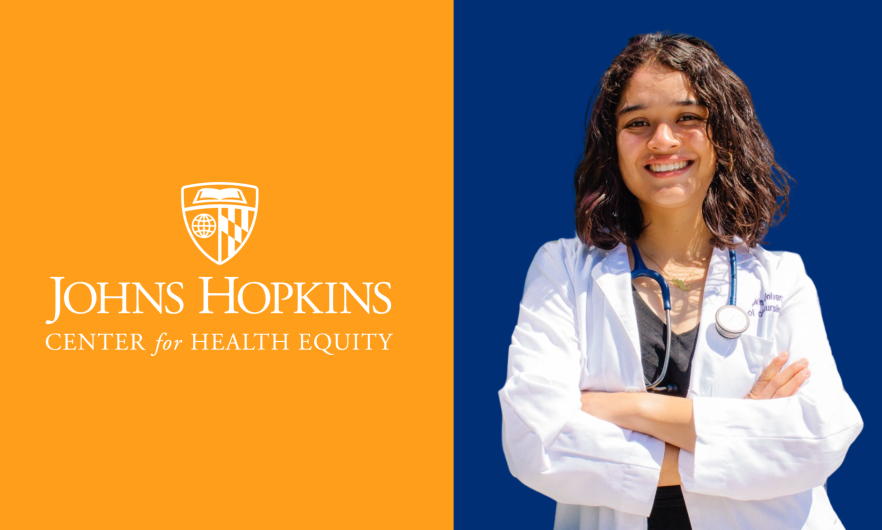Coral Alonso García Empowering Immigrant Voices in Healthcare

Coral Alonso Garcia aims to be a voice for the Latinx community by ensuring their experiences are reflected and voices amplified in research and clinical settings. As a trainee at the Johns Hopkins Center for Health Equity, Alonso García works with Spanish-speaking participants in the Mid-Atlantic Center for Cardiometabolic Health Equity (MACCHE) Healthy for Two (H42) study where she helps to enrich the study's approach by improving cultural relevance and resonance with Latinx participants as a translator.
Alonso García ensures that Spanish-speaking study participants understand the information researchers give them, and her experiences as a CHE trainee have opened her eyes to the importance of mutual understanding between researchers and study participants.
“Being a trainee [at CHE] has inspired me to get involved more with the community, and to really help my community be represented in a way that it helps them to be seen by the healthcare system in this country,” she says.
Alonso García, who is pursuing a Doctor of Nursing Practice at Johns Hopkins, has found mentorship from CHE faculty members Kelly Bower, PhD, MSN/MPH, BS, RN, and Wendy Bennett, MD, who serve as co-Primary Investigators for the H42 study. H42 aims to guide Black and Latinx pregnant individuals toward healthy weight gain and postpartum weight loss through educational interventions.
“Being a trainee [at CHE] has inspired me to get involved more with the community, and to really help my community be represented in a way that it helps them to be seen by the healthcare system in this country”
-Coral Alonso Garcia
Initially serving as a translator for H42, Alonso García's role expanded when she was invited, along with other Spanish translators from the study, to provide feedback on the efficacy of the program and clarity of interview questions.
“We shared our input of what the community needs, how the researchers have been doing in the community in Baltimore in regard to how to talk to participants, what slang to use, what they're going to understand or not; I think it's extremely important,” she says.
Alonso García has joined other community-facing organizations. Beyond her work with H42, Alonso García dedicates herself to the HEAL (Health, Education, Advocacy, and Law) Clinic, where she serves as a translator for asylum seekers navigating the complexities of the US healthcare and legal systems.
“I act as a translator for clinicians who are interviewing asylum seeker patients, and we build a legal case with that,” she says.
Additionally, Alonso García contributes to Centro SOL, an initiative connecting Latinx individuals with vital health resources. As an instructor at Centro SOL, she helps pediatric patients and their families navigate the healthcare landscape, with a particular emphasis on mental health support. Through these varied roles, Alonso García works to ensure that immigrant voices are heard and actively included in shaping healthcare practices.
Alonso García's work is driven by her desire to address the lack of representation in healthcare and research, especially for Latinx communities.
“Unfortunately, there is little to no representation of Spanish-speaking providers in the major educational systems, so I hope to represent my community and give them a voice,” she says.
The absence of Latinx providers in major educational systems can lead to research and care practices that often overlook or misunderstand the nuances of the community's needs, she notes and says that “patients feel not heard or misunderstood, or that they really cannot build trust or connection with the researchers.”
Learn more about the design and methods of the Healthy for Two (H42) study.
